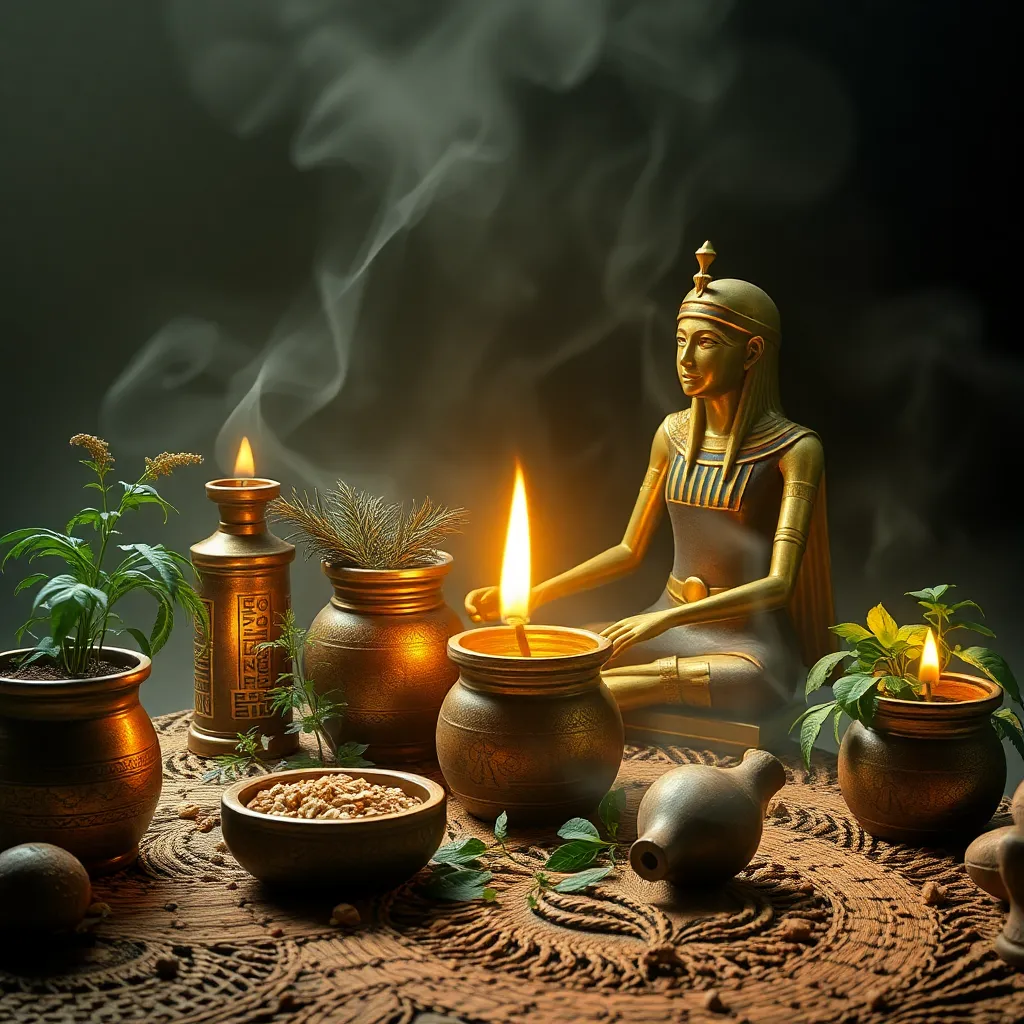The Importance of Herbs in Egyptian Rituals
I. Introduction
Ancient Egyptian civilization, one of the most fascinating societies in history, flourished along the fertile banks of the Nile River. Known for its monumental architecture, complex religious beliefs, and rich cultural practices, Egypt’s influence extended far beyond its geographical boundaries. Central to this civilization were rituals that played a vital role in religious and social life, reflecting their deep connection to the divine and the afterlife.
Rituals in Egyptian culture were not merely ceremonial; they were essential for maintaining harmony between the gods and humanity. One of the key elements in these rituals was the use of herbs, which held significant spiritual and practical importance. This article explores the historical context, types, roles, and symbolism of herbs in ancient Egyptian rituals, as well as their lasting impact on modern practices.
II. Historical Context of Herbs in Ancient Egypt
Herbs have been utilized in various forms throughout human history, and ancient Egypt is no exception. The Egyptians were among the earliest societies to document the use of herbs for both medicinal and ritualistic purposes.
Early uses of herbs in Egyptian society can be traced back to the pre-dynastic period. Evidence from archaeological findings indicates that Egyptians cultivated a range of herbs for use in food, medicine, and religious practices. The availability of certain herbs was influenced by Egypt’s geography and climate, with the Nile providing a fertile environment for cultivation.
Documentation of herbal practices can be found in ancient texts, such as the Ebers Papyrus, which dates back to around 1550 BCE. This medical papyrus lists numerous herbs and their applications, revealing the sophistication of Egyptian herbal knowledge.
III. Types of Herbs Used in Egyptian Rituals
The variety of herbs used in ancient Egyptian rituals was vast, each possessing unique properties that contributed to its significance. Some of the most common herbs included:
- Frankincense: Known for its aromatic resin, frankincense was used in incense and as an offering to the gods. It symbolized purification and was believed to facilitate communication with the divine.
- Myrrh: Similar to frankincense, myrrh was also used in incense and embalming. It represented mortality and was associated with the afterlife.
- Garlic: Valued for its medicinal properties, garlic was believed to ward off evil spirits and was often included in offerings for protection.
Beyond these common herbs, specific plants were linked to various deities, enhancing their significance in rituals dedicated to these gods. For example, the lotus flower was associated with creation and rebirth, often seen in temple iconography.
IV. The Role of Herbs in Religious Practices
Herbs played a crucial role in numerous religious practices in ancient Egypt. They were commonly used in offerings and sacrifices to please the gods and secure their favor.
During mummification, herbs were integral to the preservation process, with myrrh and other aromatic plants used to mask the scent of decay and protect the body from corruption. This practice was rooted in the belief that the body needed to be preserved for the afterlife.
Furthermore, herbs held spiritual significance and symbolism within rituals. They were seen as conduits between the earthly realm and the divine, embodying the essence of life and death.
V. Herbs and Healing in Egyptian Rituals
In addition to their ritualistic roles, many herbs were recognized for their medicinal properties. Ancient Egyptian healers employed a range of herbs to treat ailments, drawing upon their extensive knowledge of herbal remedies.
The connection between healing and spiritual practices was strong in ancient Egypt. Many ailments were believed to have spiritual causes, and thus, healing rituals often combined physical remedies with spiritual cleansing.
Some key herbal remedies used by priests and healers included:
- Willow: Used for its pain-relieving properties.
- Hyssop: Employed for purification rituals.
- Fenugreek: Known for its anti-inflammatory effects.
VI. The Symbolism of Herbs in Art and Iconography
The significance of herbs extended beyond their physical use; they were also depicted in art and iconography. Tomb paintings and carvings frequently illustrated herbs, emphasizing their importance in the afterlife and spiritual belief systems.
Different herbs carried symbolic meanings. For instance, the lotus, often shown in various art forms, symbolized resurrection and purity, while the papyrus plant represented lower Egypt and was a symbol of life and fertility.
This rich symbolism continues to influence modern perceptions of ancient Egyptian spirituality, as herbs are recognized for their multifaceted roles in both life and afterlife.
VII. Modern Interpretations and Practices
In recent years, there has been a resurgence of interest in herbalism, with many people looking to ancient practices for guidance. The holistic approaches of ancient Egyptian herbalism have influenced contemporary herbal practices, incorporating both medicinal and spiritual aspects.
Modern practitioners often draw upon the knowledge preserved in ancient texts, adapting these practices to fit contemporary needs. This fusion of ancient wisdom and modern understanding highlights the enduring legacy of Egyptian herbal traditions.
Moreover, many modern rituals, whether spiritual or healing, reflect principles rooted in ancient practices. The emphasis on natural remedies and holistic healing can be traced back to the herbal traditions of ancient Egypt.
VIII. Conclusion
Throughout ancient Egyptian civilization, herbs were more than mere plants; they were vital components of rituals that connected humanity to the divine. Their significance in offerings, healing practices, and spiritual symbolism illustrates the profound relationship between the Egyptians and the natural world.
The legacy of these herbal traditions persists today, reminding us of the interconnectedness of life, spirituality, and nature. As we continue to explore the rich tapestry of ancient cultures, the role of herbs in Egyptian rituals offers valuable insights into our understanding of healing, spirituality, and the human experience.
Ultimately, the exploration of herbal traditions in ancient cultures invites further research and appreciation, enriching our knowledge of the past and its relevance to our lives today.




